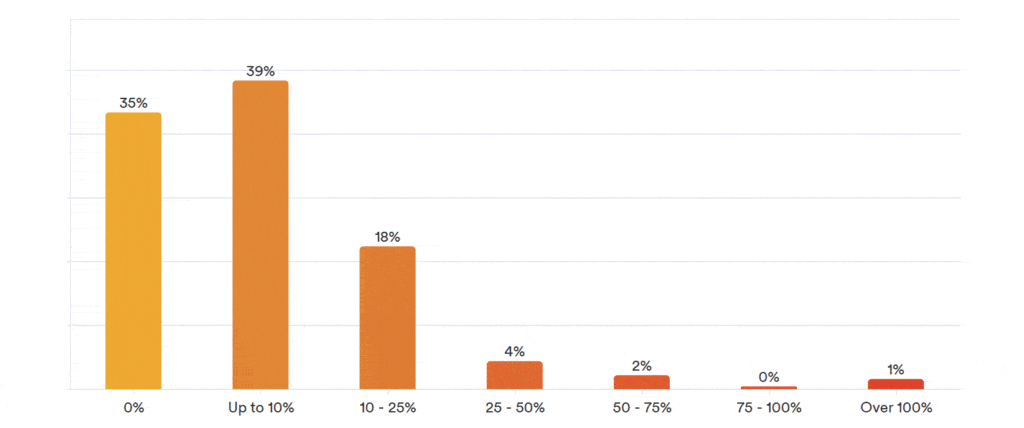According to the March LANDTHINK Pulse results, 39% of our audience indicated that if they were buying rural land, they WOULD be willing to pay up to 10% over Fair Market Value (FMV) for their dream property. Coming in a close second, 35% said they WOULD NOT be willing to pay over FMV at all for the perfect property. When it comes to buying, selling, or investing in land, one term that plays a critical role is Fair Market Value (FMV). Whether you are an owner looking to sell your property or a buyer planning to invest in a new property, understanding the concept of FMV is essential. It ensures that property transactions are conducted transparently and reflect the true worth of a property in the current market conditions.
In the last few years, buyers have been offering more than FMV and sellers are snatching up those offers. For many buyers, paying over FMV goes against the grain. However, in a supercharged land market like we’ve been experiencing the past few years, where there are multiple bids on a property, buyer demand can push the price beyond FMV and even beyond what an appraiser determines it is worth. Last month’s LANDTHINK Pulse question asked: What percent OVER Fair Market Value are you willing to pay for the perfect, hard-to-find property that meets all your criteria? The results indicated many buyers are still willing to pay over FMV to snag the land that meets their desires and suit their needs.

What is Fair Market Value?
The official definition of fair market value used by the Internal Revenue Service states that, “Fair market value is the price that would be agreed on between a willing buyer and a willing seller, with neither being required to act, and both having reasonable knowledge of the relevant facts.”
Simply put, fair market value doesn’t necessarily represent a property’s value. The world of fair market value is not the real world. It is somewhat hypothetical. It is a special world in which the participants are expected (defined) to act in specific and predictable ways. It represents the estimated amount of money a buyer and seller would likely agree upon through negotiations and under normal conditions. The real world is populated by real people, whose actions are unpredictable. Real people engage in actual transactions with unpredictable results.
There may be times when land is sold above or below its fair market value. Essentially, if a buyer or seller is reacting to outside pressures — medical emergency, loss of a job, death in the family — the price point of a property might drift away from its fair market value.
Fair market value is often confused with other methods of valuation. But to provide some clarity — let’s take a look at how fair market value differs from appraised value and assessed value.
An appraisal is another valuation method where a professional appraiser offers an independent assessment of a property’s value. The appraiser provides a determination of the value based on many factors, such as identifying the land quality, size, and location, sales comps, best use of the land, and potential future development. Any loan for a property is based on the appraisal value.
Assessed value is a figure local governments use to determine property tax. It’s a percentage of the property’s fair market value, and your county’s assessor calculates it. Though it is not directly related to the offer and negotiation stages, it is something to pay attention to during the land buying process as it relates to property taxes once you become a landowner.
How is FMV Calculated?
FMV is not necessarily equivalent to the property’s tax value or appraised value. If the market value of a property shifts, the appraised value could shift along with it or stay mostly the same. Minor fluctuations in supply, demand, and other market conditions can change how much a property will sell for in any given month or year. For this reason, FMV is less of a precise calculation of a property’s worth but rather an estimation of what it will currently sell for given the state of a specific market at a specific time.
To determine fair market value, real estate professionals typically look for at least three comparable properties, or “comps”— properties with attributes similar to those of the one in question—that sold in the same area within the past few months.
If all three properties were identical to the property under evaluation, their average sale price would serve as FMV. Of course, no two properties are exactly the same, so adjustments typically are made in light of differences in the properties. The amounts of these adjustments are based on the evaluator’s experience and knowledge of what various property features are worth in their local markets. After the comps’ sale prices are adjusted to conform with the one in question, they are averaged to provide a fair market value. Sellers and listing agents use FMV to help price property for the current market.
Reasons to Offer More Than FMV
- If you love the piece of land and want to make sure that you get it, a higher offer price is definitely a way to get noticed; however, it’s not the only reason that a seller would choose your offer.
- If there is a bidding war and lots of competition for the property, submitting an offer over FMV is a good way to stand out from the crowd.
- The property is undervalued. Comparable sales from your land agent can help you determine whether the property is undervalued and if offering over FMV is appropriate.
In a competitive real estate market, it can be easy to get caught up in bidding wars and even the fear that you’ll somehow miss out on owning your own land. And if you keep putting in offers that are rejected, it might feel like you have to push even harder to snag a property.
Buying land in the current market has led people to pay over FMV, pay more than the appraised value, and surrender necessary contingencies designed to protect them and pay. It’s critical that you consider your budget and goals carefully.
Here are two factors you should consider before you pay over the value of property:
Actual affordability. The first, and perhaps most obvious one, is can you afford it? If the appraisal comes in low, then you’ll have to make up the difference out of pocket. If that leaves you with an empty savings account and no safety net, then buying the land is not the healthiest for you financially. If the property in question is one that you see as a dream property for you and your family, your sense of urgency may increase. But even the most perfect property isn’t worth overextending yourself.
After considering the many moving parts involved in a land transaction, determine what’s most important and what you’re willing to agree on for a price compared to a property’s actual market value. Whether you’re looking to buy or sell land, it’s essential to ensure you’re getting your money’s worth.
Do you love it? Finally, be honest with yourself about how badly you want to own this piece of land. If this is not your dream property, you could quickly find yourself with a case of buyer’s remorse. And selling land that costs more than it’s worth takes time and money.
Do you have a suggestion for next month’s Pulse question? Submit your question and we might choose yours!
This content may not be used or reproduced in any manner whatsoever, in part or in whole, without written permission of LANDTHINK. Use of this content without permission is a violation of federal copyright law. The articles, posts, comments, opinions and information provided by LANDTHINK are for informational and research purposes only and DOES NOT substitute or coincide with the advice of an attorney, accountant, real estate broker or any other licensed real estate professional. LANDTHINK strongly advises visitors and readers to seek their own professional guidance and advice related to buying, investing in or selling real estate.










Add Comment